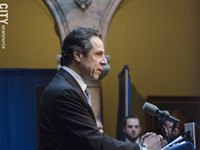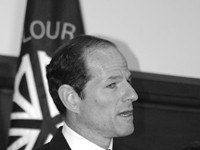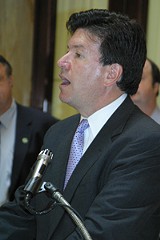[
{
"name": "500x250 Ad",
"insertPoint": "5",
"component": "15667920",
"parentWrapperClass": "",
"requiredCountToDisplay": "1"
}
]
By the time this article hits the streets, New York's Democrats will have elected a gubernatorial candidate. And barring supernatural intervention, it's Eliot Spitzer.
Challenger Tom Suozzi will fade into the background and possibly out of the public eye for good.
But by pushing for reform in Albany, and harping on property taxes during the primary, he's already influenced Spitzer's platform.
One of the functions of long-shot candidates is to inject important new ideas into the public political dialogue. The best we can hope for is that when Spitzer's elected, some of his opponents' ideas follow him into the governor's mansion.
If Suozzi made reform his particular franchise, the lone Republican left in this race, John Faso, has gone a long way toward making Medicaid his.
Last week in Rochester (and at a follow-up press conference in Syracuse), Faso unveiled his plan to overhaul a program that's one of the state's largest expenses.
While the other candidates have a few paragraphs on their websites devoted to the topic, Faso's plan is comprehensive. It runs for nine pages, and that's not counting two pages of references and a chart that are appended.
Of course, some of it is rhetoric that's as much politics as it is policy. And Faso hasn't passed up the low-hanging fruit that Spitzer and Suozzi are talking about --- stuff like ramping up the state's efforts to root out waste, fraud, and abuse or expanding the use of generic drugs.
But Faso also has more ideas --- and more specific ones --- on how to tame the monster that Medicaid has grown into. Some of them are at least worthy of the public's careful attention.
One of the themes Faso emphasized repeatedly during his trip here was that he would make Medicaid both cheaper and better. That's what every politician says, but Faso has a specific set of goals --- which make up about a third of his plan --- to do just that. Ironically, although he's the lone fiscal conservative in the race, his plans all involve spending more money initially, in hopes that those targeted investments will preclude more expensive care down the road.
One of the chief drivers of Medicaid costs is Medicaid recipients' use of hospital emergency departments for routine care. That costs more than comparable service at a family doctor's office or a clinic, and the bill gets passed on to taxpayers. Faso wants to change that by changing some of the factors that send Medicaid recipients to the ER in the first place.
For example: many doctors don't accept Medicaid patients. That's at least in part because the state's reimbursement rates --- unlike just about everything else about New York's Medicaid program --- lag behind national rates. Kent Gardner, president and chief economist at Rochester's Center for Governmental Research, cites anecdotal evidence of just how low those rates are:
"I've been told that docs who accept Medicaid patients don't apply for reimbursement because the cost of the paperwork exceeds the value of the reimbursement," he says.
The fewer the doctors who accept Medicaid patients, the higher the number of patients who wind up in the ER, at higher costs, reasons Faso. Giving doctors more money --- and thereby a higher incentive to provide cheaper care and preventive care --- would save the state money in the long run, he says.
Faso also wants to tap an intermediate layer of care between doctors and emergency rooms: community health centers like the JordanHealthCenter in Rochester. His plan calls for boosting the number of CHC's from 60 to 100 over four years. That would require an upfront investment (Faso skirts the question of how much), but he thinks it would save money in the long run by reducing hospital visits. Faso cites an Action Alliance for Children report that estimated that every dollar invested in a CHC in California saved $2.70.
Not all of Faso's plan is as specific. He wants to improve technology systems to track patients through Medicaid but says little about how or about what the cost would be. And while some of his plans might be welcomed by many (incentives to keep people out of nursing homes, for instance), others may not (he wants to "right-size" the hospital infrastructure --- closing some hospitals or at least reducing the number of beds statewide).
Still, the plan shows that Faso and his policy wonks have done their homework and understand the system as well or better than most. Let's hope the public --- and the politicians --- are paying attention.
Speaking of New York Governor's Race, Medicaid Reform
-

The New York governor's race: big choices, little attention
Oct 31, 2018 -

The Nixon-Cuomo race
Aug 29, 2018 -

Cuomo deserves our vote
Oct 15, 2014 - More »
Latest in Columns
More by Krestia DeGeorge
-

The last wild Finger Lakes
Jan 17, 2007 -

Designers get their turn at downtown
Jan 17, 2007 -

From the new governor: fighting words
Jan 10, 2007 - More »






